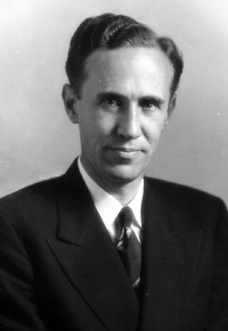Ed Ramage
Edward Vandiver Ramage (born October 2, 1908 in Weaverville, North Carolina; died December, 1981 in Arkansas) was the pastor of First Presbyterian Church from 1946 to 1963 and one of the co-signers of the letter, "A Call for Unity", to which Martin Luther King, Jr responded with his "Letter from Birmingham Jail."
Ramage was one of three children born to Samuel Johnson and Elizabeth Jane Vandiver Ramage of North Carolina. His father, a trained vocalist, had moved from Pennsylvania to North Carolina to pursue a career in the lumber industry. When he died in 1917 Mrs Ramage raised the children herself. Edward became interested in the ministry during summer camps at Montreat and attended Davidson College, Emory University and the Columbia Theological Seminary in Decatur, Georgia, where he earned a Doctorate of Divinity in 1932.
With paid posts scarce in the midst of the Great Depression, Ramage lived off bread crusts and was allowed to remain living in the Seminary's dormitory through the summer. He hitchhiked his way back into the mountains and found work in an auto repair shop. In September he finally received an offer to split time at three churches all in the vicinity of Rome, Georgia.
Ramage later led congregations in Decatur, Alabama and in Oklahoma City, Oklahoma. He was called to First Presbyterian in 1946. He caught the attention of medical illustrator Katherine Morrow Watters. They were married on April 20, 1948 and moved into a large, brick house on Aberdeen Road.
Later, Ramage was named moderator of the Alabama Synod of the Presbyterian Church in the United States.
During the lead-up to the organized protests of the Civil Rights Movement's Birmingham Campaign, Ramage and seven other moderate white clergymen asked Birmingham's African American residents to negotiate with local leaders rather than follow outsiders toward confrontation in an open letter. When protesters did arrive at the church that Easter Sunday, Ramage welcomed them, though some of his congregation walked out. Once Ramage finally saw King's "Letter from Birmingham Jail", published in May by the American Friends Service Committee, he told his assistant, William Ford that it was as if he had received an epistle from St Paul himself.
For his commitment to integration, Ramage and his family received death threats and his car's tires were slashed. A lay committee within the church was formed to investigate "Communist treachery". He remained steadfast, telling church elders that he would not sacrifice Christian principles to preserve peaceful unity. In the fall of the same year, Ramage accepted a position at St Paul's Presbyterian Church in Houston, Texas and retired ten years later. In the ensuing years the leaders of First Presbyterian have come to treasure the example set by their former pastor and his courageous focus on Christian principles in a storm of torment has served as a guidepost.
References
- Bass, S. Jonathan (2001) Blessed Are The Peacemakers: Martin Luther King, Jr., Eight White Religious Leaders, and the "Letter from Birmingham Jail". Baton Rouge: LSU Press. ISBN 0807126551
